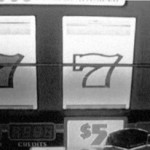Imagine this scenario; you are in your favorite casino playing your favorite slot machine, you’ve been playing about two and a half hours and just put your last quarter in hoping to hit it big. It didn’t happen and now you’re out $125. You decide to head to the $19.95 all-you-can-eat buffet and drown your sorrows with BBQ ribs, fried chicken, and soft-serve ice cream. On your way to the buffet you see the jackpot lights go off on the exact machine you just left. You think, if only I’d have stayed a couple of minutes longer, that jackpot would have been mine. The truth is that even if you would have stayed at the slot machine, you likely wouldn’t have hit the jackpot. Today’s slot machines use random number generators for the symbol combinations, so they are always changing; it is not possible to just “wait a machine out”. If that were the case, you could just keep playing until you hit the jackpot. The truth is the odds of hitting a jackpot on the 3rd spin are the same as hitting a jackpot on the 30,000th spin. You also might think that if a machine hits a jackpot, it won’t hit another one for some time, also not true; the odds are the same on hitting a jackpot the very next spin. Many people find slot machines fun to play and stimulating. The authors of one study (Yucha 2007) reported that gambling increased physiological variables such at systolic and diastolic blood pressure, heart rate, respiratory rate, and skin temperature. It is understandable how people can get addicted to slots. However, if you’re looking to actually win money at the casino, slots are not a very good bet. Your odds of winning at games like blackjack or craps are actually higher. Many slot machines are programmed to pay out roughly 92%, so for every dollar you put in, you win back on average 92 cents. Good deal for the casino, bad deal for you.
Reference:
Yucha C, Bernhard B, Prato C: Physiological effects of slot play in women. Applied Psychophysiology & Biofeedback (2007), Vol 32, pps. 141-147

